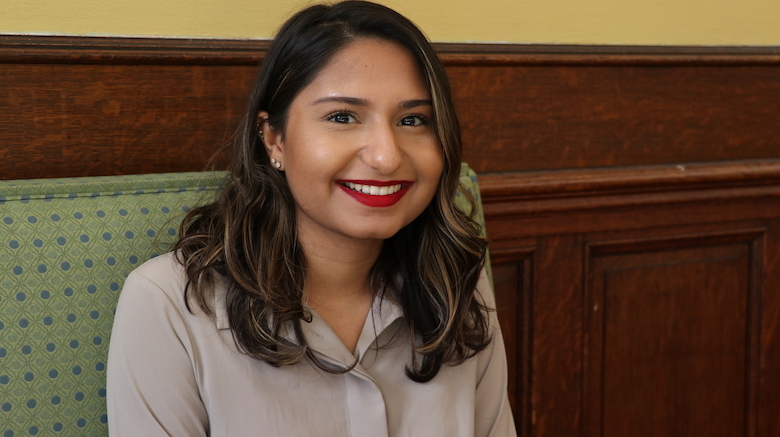The international surge of feminism sparked by the #MeToo movement made its way to a SJC Brooklyn senior’s research project.
Alia Rohain Khizer, a senior psychology major, designed a research project regarding sexual attitudes toward women as a result of the clothing that they wear — a concept heavily debated during the #MeToo movement that helped break the silence and enforced the idea that survivors of sexual assault are not alone. She presents her research on March 2 at the Eastern Psychological Association (EPA) conference in Manhattan.
Khizer’s project, titled “She’s Asking For It,” was conceptualized in her research methods class last semester, under the instruction of Michael Magee, Ph.D., assistant professor of psychology. In the project, Khizer anonymously surveyed 120 people to see if a woman’s clothing affects whether or not society believes she was “asking” for sexual harassment or assault.
The 22-year-old showed each of the surveyors a picture of the same model wearing two different dresses: one was short and revealing, while the second was longer and more modest. In both pictures the model was the same and the dresses were similar in color.
Khizer posed 10 questions in the survey — including “If she were grabbed in a club, would she be asking for it?” — to get a reading on the beliefs of the responders. Half the participants saw the photo of the model in the longer dress, while the other half saw the model in the shorter dress.
“We found that only conservatives blamed her more — not liberals,” Khizer said. “That was the most significant data we found from that.”
Khizer said Magee pushed her to submit her project to the EPA conference because of its political relevance.
Getting Real World Experience
Khizer’s ability to go beyond the requirements of class with her project impressed her professor.
“Alia knows who she is and what she wants to say,” Magee said. “And this allowed her to very easily focus on a research project in my research methods class at the end of her junior year, which focused on her interest in the #MeToo movement and victim blaming in the area of sexual assault.
“Alia took the lead of her group and put together a true experiment with an original sexual attitudes survey as the dependent measure,” he added.
In addition to expanding on her research project, Khizer worked as Magee’s research assistant in the fall semester. Together the duo explored the spirit of the checks and balances within the empirical method. Magee explained that the purpose of the research was to review the impact of social psychology by replicating a famous study.
Khizer’s efforts to go above and beyond are a true example of St. Joseph’s College’s pillars of intellectual value and social responsibility.
And her hard work is one of the many reasons the College’s highly successful educators — including Magee — enjoy giving students access to unique academic experiences.
“As a mentor, it’s hard to think of anything more satisfying than watching your student take her own ideas and implement them capably all on her own,” Magee said. “I jokingly refer to her as ‘my graduate student’ because, well, she’s the closest thing I’ve got to one! It’s a really pleasure working with highly motivated students; a true delight of teaching.
“Watching Alia put herself into original research, true scholarship, has been one of the most rewarding experiences I’ve had in my short time at St. Joe’s.”

